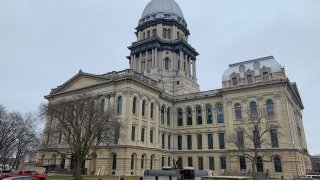
Alarmed and at the same time energized by a Texas law that bans most abortions, abortion-rights advocates in the General Assembly are targeting what people on both sides of the contentious issue consider the last restriction on access to abortion in Illinois.
Democrats in the House and Senate are pushing to repeal a law requiring that a parent or guardian be notified at least 48 hours in advance when a minor 17 or younger seeks an abortion. Consent is not required as it is in nearly half the states.
To parental-notice supporters, it’s a “commonsense” approach to ensuring that families are involved in a minor’s health care and even identify children in abusive situations who need additional help. Opponents say it serves no purpose but to delay a minor’s constitutional right to choose their health care, a disruption that could have adverse effects.
Repeal has a sudden sense of urgency among proponents. The Texas law prohibits most abortions after a cardiac activity is detected — at about six weeks. And the U.S. Supreme Court will hear in December a challenge to a Mississippi law that bans most abortions after 15 weeks.
“There is another dimension to this now...,” said Rep. Anna Moeller, an Elgin Democrat and the repeal’s House sponsor. “I expect Texas-style laws will be coming to states near us. We’re already surrounded by states that have very strict abortion-access laws. It will be this race to the bottom: Who can be the toughest on abortion until the Supreme Court weighs in?”
Moeller said she’s talking to colleagues, counting votes and trying to persuade moderate Democrats. Democratic Sen. Elgie Sims of Chicago has similar legislation in the Senate, but he did not respond to a message seeking comment. If they can collect the votes, they’ve got an ally ready to sign the law.
“I’m in favor of repealing PNA,” Democratic Gov. J.B. Pritzker said last week. “I don’t know whether the Legislature will bring this up over the two weeks of veto session, but I have stood in favor of it since I was elected.”
Local
The 1995 law, adopted during the only legislative session in the past half-century that Republicans controlled both the House and Senate and the governor’s office, did not take effect until 2013, after years of judicial challenges by the American Civil Liberties Union.
Since then, the number of abortions among minors has dropped 38%, to 1,092 in 2018, while abortions overall among Illinois residents remained steady, according to Illinois Department of Public Health statistics. The numbers in both categories have plummeted since the mid-90s; overall, sinking 25% from a high of 49,131 in 1996 while abortions among minors hit a high of 4,853 in 1995 and a low of 1,003 in 2017, a drop of 79%.
Feeling out of the loop? We'll catch you up on the Chicago news you need to know. Sign up for the weekly> Chicago Catch-Up newsletter.
“It’s a very commonsense law that actually transcends the abortion issue,” said Amy Gehrke, executive director of Illinois Right to Life. “This has to do with the basic right of parents to be involved in their children’s health care decisions. Here in Illinois ... minor girls can’t get their ears pierced, they can’t get a tattoo, they can’t go to a tanning bed, they can’t go on a school field trip, they can’t even get an aspirin from the school nurse without their parents’ explicit consent.”
Gehrke stresses many misinterpret the Illinois law as requiring consent. It’s simply notification to a parent, grandparent, or guardian. And it’s the facility conducting the procedure, not the minor, who must provide the notice.
Of 38 states requiring parental involvement in a minor’s abortion decision, 21 require parental consent — in three of those, both parents must consent, according to the Guttmacher Institute.
If a girl is in a family situation where notifying parents or other relatives would result in her harm, she may go to a judge who then decides whether she is mature and emotionally sound enough to decide for herself. That has happened 550 times since 2013, with a judge denying abortion access once, according to Brigid Leahy, senior director of public policy for Planned Parenthood of Illinois.
Gehrke and other pro-notice activists maintain that the judicial bypass allows a judge to identify minors who are abused or even victims of sex trafficking and get them the social services they need to extricate themselves. Their opponents contend judges are only there to decide the abortion question and have no involvement in saving minors from treachery.
Ed Yohnka, spokesman for the ACLU, whose Judicial Bypass Coordination Project assists girls seeking court intervention, said project lawyers have never experienced an instance where a child needed that kind of rescue, but that judges absolutely would intervene if needed.
That’s reason enough to maintain the law, said Bob Gilligan, executive director of the Catholic Conference of Illinois, which has been lobbying lawmakers to block repeal since the spring legislative session ended.
“If you limit this law, then what what’s out there?” Gilligan asked. “Nothing. Is that good public policy?”



